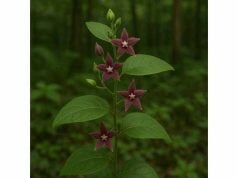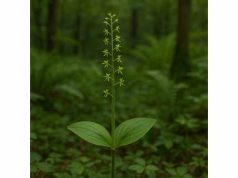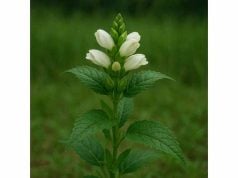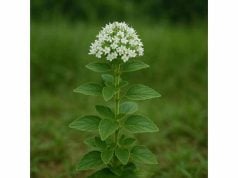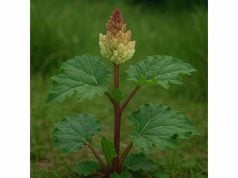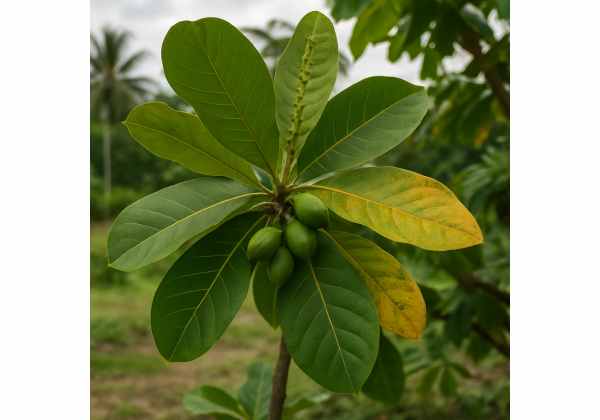
Tropical Almond is a versatile botanical renowned for its impressive health benefits, unique active compounds, and extensive traditional medicinal applications. Rich in antioxidants, healthy fats, and essential nutrients, this tropical nut supports cardiovascular health, skin vitality, and metabolic balance. Its potent phytochemicals deliver anti-inflammatory and antimicrobial effects, contributing to overall well-being. Used in culinary, cosmetic, and herbal medicine, Tropical Almond provides both internal nourishment and external care. In this comprehensive article, we explore its botanical characteristics, chemical makeup, health advantages, practical uses, scientific research findings, and answer frequently asked questions—all while offering insights, real-life examples, and dosage recommendations to guide its safe, effective use.
Table of Contents
- Flora Characteristics and Visual Identification
- Chemical Characterization and Potent Components
- Health Advantages and Core Attributes
- Practical Applications and Risk Precautions
- Investigative Findings and Major Research Outcomes
- Common Queries and Expert Advice
Flora Characteristics and Visual Identification
Tropical Almond grows as a robust, evergreen tree widely distributed in coastal tropical and subtropical regions around the globe. Botanically classified under the family of flowering plants, it shares similarities with other nut-producing species yet stands out due to its unique morphology and environmental adaptability. The tree is characterized by a broad, spreading canopy that offers generous shade and is highly valued for its ornamental appeal. Its glossy, dark-green leaves exhibit an elliptical to lanceolate shape with smooth margins—a feature that becomes even more striking when the leaves transition to warm, reddish hues during seasonal changes.
The bark of the Tropical Almond tree is smooth and slightly textured, often displaying a grayish-brown tone that harmonizes with its surroundings. This bark not only protects the inner tissues but also contributes beneficial compounds utilized in traditional medicine. The tree’s flowers are small, clustered, and typically white or pale yellow, exuding a subtle fragrance that attracts a variety of pollinators. These blossoms give rise to the fruit, which encases a hard kernel surrounded by a fibrous husk. The nut itself is oval-shaped with a delicate texture and a mild, nutty flavor that renders it popular in both culinary applications and natural remedies.
Native to regions with a warm, humid climate, Tropical Almond thrives in well-drained, sandy loam soils where it receives abundant sunlight interspersed with occasional refreshing rains. It is often found lining seashores, riverbanks, and even inland landscapes where tropical conditions prevail. The robust root system of the tree helps to stabilize soil in areas prone to erosion and contributes significantly to the ecological balance of its natural habitat. Over time, the Tropical Almond tree matures to a majestic stature, serving as both a source of natural food and a symbol of resilience in challenging environmental conditions.
Historically, indigenous communities have revered the Tropical Almond tree not only for its nutritional yield but also for its therapeutic virtues. Traditional healers prepared decoctions from its leaves and bark to alleviate ailments ranging from digestive disturbances to skin inflammations. The nut, with its high nutrient profile, was considered an essential component of diets, offering sustained energy and contributing to overall vitality. Its integration into local cuisines, ranging from raw consumption to roasting and incorporation into desserts, underscores the tree’s cultural significance and multifaceted role in indigenous wellness practices.
Beyond its medicinal and nutritional applications, the tree is also celebrated for its contribution to sustainable landscaping and environmental conservation. Urban planners and gardeners alike appreciate its ability to create natural canopies and enhance green spaces in tropical locales. The Tropical Almond tree’s efficient water uptake and resistance to drought make it an ideal candidate for reforestation projects and landscape architecture in regions facing water scarcity. Furthermore, its aesthetically pleasing form, coupled with seasonal variations in foliage color, adds dynamic beauty to parks, gardens, and public spaces.
Modern horticulturists have successfully cultivated Tropical Almond outside of its native region by replicating conditions of high humidity, ample sunlight, and well-drained soils. This cultivation has enabled both agricultural and therapeutic industries to harness its benefits on a larger scale. As researchers continue to decode its genetic makeup and environmental adaptability, the potential for developing improved cultivars with enhanced nutritional and medicinal properties grows ever more promising.
In conclusion, the botanical profile of Tropical Almond is as multifaceted as its uses. Its striking physical attributes, ranging from distinctive leaves and delicate blossoms to its resilient nut, support a variety of ecological, nutritional, and medicinal roles. This tree embodies a bridge between traditional wisdom and modern environmental management, offering valuable insights into sustainable agriculture and natural health. Whether admired in its native wild or carefully cultivated in a landscaped garden, Tropical Almond continues to symbolize the harmonious balance between nature’s bounty and human ingenuity.
Chemical Characterization and Potent Components
The health-promoting properties of Tropical Almond are intricately linked to its complex chemical composition. Researchers have identified a wide range of bioactive compounds that work synergistically to provide a host of medicinal benefits. Below is an organized overview of the key active components present in Tropical Almond:
- Monounsaturated and Polyunsaturated Fatty Acids
Tropical Almond is particularly rich in healthy fats, including oleic acid (a monounsaturated fatty acid) and linoleic acid (a polyunsaturated fatty acid). These components support cardiovascular health by aiding in cholesterol balance and reducing inflammation. Their incorporation into cell membranes also enhances cellular signaling, contributing to overall metabolic efficiency. - Phytosterols
The nut contains significant amounts of phytosterols, such as β-sitosterol, which are known to lower cholesterol levels and support heart health. These compounds compete with dietary cholesterol for absorption, thereby promoting improved lipid profiles and reducing the risk of cardiovascular disease. Additionally, phytosterols exhibit anti-inflammatory properties that further bolster their therapeutic potential. - Flavonoids and Polyphenols
Key antioxidants like quercetin, kaempferol, and various phenolic acids play a critical role in neutralizing free radicals. Their potent antioxidant activity helps minimize oxidative damage, thereby protecting cells and tissues from premature aging and chronic conditions. These compounds not only contribute to anti-inflammatory effects but are also believed to improve vascular function and promote overall cellular health. - Vitamin E (Tocopherols)
A notable concentration of vitamin E in Tropical Almond contributes to its skin-protecting and anti-aging benefits. As a powerful fat-soluble antioxidant, vitamin E supports immune function and cellular repair by scavenging harmful free radicals. Its presence enhances the nut’s ability to maintain skin moisture and elasticity, making it a sought-after ingredient in cosmetic and dermatological applications. - Essential Minerals and Trace Elements
Tropical Almond provides an array of micronutrients, including magnesium, potassium, and calcium. These minerals are crucial for maintaining proper bone health, nerve function, and muscle contraction. In particular, the presence of magnesium supports enzyme function and energy production at the cellular level, fostering a state of overall metabolic wellness. - Dietary Fiber
Although not a typical “active compound,” the high fiber content in Tropical Almond is vital for digestive health. Dietary fiber assists in regulating blood sugar levels, aids in digestion, and promotes a feeling of fullness—thereby supporting weight management and gut health. The fibrous matrix also plays a role in reducing the overall glycemic index of meals that include the nut. - Triterpenoids
These bioactive compounds contribute to the anti-inflammatory and analgesic properties associated with Tropical Almond. Triterpenoids help in alleviating inflammation at the molecular level and may assist in moderating chronic pain. Their presence further supports the nut’s role in traditional medicinal formulations aimed at reducing joint and muscle discomfort. - Saponins
Saponins are natural glycosides known for their cholesterol-lowering and immune-boosting properties. In Tropical Almond, these compounds help enhance the body’s resistance to infections and may contribute to lower levels of blood lipids, thereby supporting cardiovascular health. Their mild detergent properties also facilitate the absorption of other active compounds during digestion. - Amino Acids and Proteins
The protein content of Tropical Almond consists of essential amino acids, which serve as the building blocks for muscle repair, enzyme synthesis, and tissue regeneration. This nutrient profile makes it an excellent dietary addition for individuals seeking to boost overall protein intake naturally while enjoying the nut’s flavor and health benefits. - Antioxidant Enzymes
Emerging studies have highlighted the presence of naturally occurring antioxidant enzymes in Tropical Almond. These enzymes enhance the overall antioxidant capacity of the nut and contribute to a balanced oxidative state. Their ability to mitigate oxidative stress is believed to be synergistic with the polyphenols and flavonoids present in the nut.
Collectively, the diverse chemical matrix of Tropical Almond offers a robust foundation for its impressive range of health benefits. The synergistic interaction of fatty acids, phytosterols, flavonoids, vitamins, minerals, and other bioactive constituents makes this nut a powerhouse of natural therapeutic potential. The antioxidant and anti-inflammatory actions derived from this complex blend not only improve cardiovascular health and skin vitality but also bolster immune function and metabolic balance.
Researchers continue to explore the mechanisms behind these compounds to optimize extraction techniques and enhance the bioavailability of Tropical Almond’s nutrients. Advances in phytochemical analysis are gradually unveiling the intricate interplay between these components, providing deeper insights into how they collectively contribute to human health. The ongoing research not only validates the traditional use of Tropical Almond in various cultures but also points toward innovative applications in both nutritional and pharmaceutical products.
Furthermore, studies are investigating the potential dose-dependent effects of these compounds, aiming to determine the optimal consumption levels for maximizing health benefits. Such research is vital, as it helps establish standardized guidelines and supports the integration of Tropical Almond into modern functional foods and nutraceuticals. With its profound chemical profile, Tropical Almond stands out as an exemplary ingredient in the realm of natural health, offering both preventive and supportive solutions to common health challenges.
Health Advantages and Core Attributes
Tropical Almond is celebrated worldwide for its impressive array of health benefits and intrinsic qualities that promote holistic well-being. Its nutrient-rich profile and bioactive compounds combine to offer multifaceted advantages that support various body systems. Among its most significant benefits, Tropical Almond is renowned for enhancing cardiovascular function, promoting healthy skin, and serving as a natural anti-inflammatory agent. Its regular consumption has been associated with improved lipid profiles, better digestion, and an overall enhancement in vitality.
One of the primary health advantages of Tropical Almond is its ability to support heart health. The presence of monounsaturated fats and phytosterols plays a crucial role in reducing bad cholesterol while simultaneously elevating good cholesterol levels. This lipid-balancing act is fundamental for preventing atherosclerosis and other cardiovascular disorders. Additionally, the anti-inflammatory properties of its flavonoids and triterpenoids help to reduce arterial inflammation, thereby maintaining optimal blood flow and reducing the overall strain on the cardiovascular system.
The benefits extend beyond heart health. Tropical Almond is also highly regarded for its positive impact on skin health. The vitamin E and essential fatty acids present in the nut work synergistically to protect the skin against oxidative damage, promote moisture retention, and improve elasticity. These compounds not only help in reducing fine lines and wrinkles but also support the skin’s natural barrier function—essential for maintaining a youthful and vibrant appearance. Individuals who incorporate Tropical Almond into their diets or use derived extracts in topical formulations often report an improvement in skin tone and texture.
Digestive health is another domain where Tropical Almond excels. Its high dietary fiber content aids in regularizing bowel movements, preventing constipation, and promoting a healthy digestive tract. This fiber acts as a prebiotic, encouraging the growth of beneficial gut bacteria that facilitate optimal nutrient absorption and overall gut health. A balanced digestive system is key to maintaining energy levels and supporting immune function, making Tropical Almond a valuable dietary addition for those looking to enhance their overall well-being.
Beyond its direct nutritional benefits, Tropical Almond exhibits adaptogenic qualities that help the body manage stress and maintain homeostasis during challenging times. The nut’s rich nutrient profile supports adrenal function and stabilizes blood sugar levels, which are critical components in the body’s stress response mechanism. By moderating cortisol levels, Tropical Almond assists in reducing the physical and mental impacts of stress, thereby fostering a more balanced and resilient state of health.
Furthermore, the antioxidant properties of Tropical Almond provide cellular protection, limiting the damage caused by free radicals and environmental toxins. This protective effect is not only crucial for reducing the risk of chronic diseases but also for supporting the immune system. A strengthened immune system is better equipped to fend off infections and recover from illnesses, contributing to a general state of robust health.
Tropical Almond also has metabolic benefits. Its combination of healthy fats, proteins, and fibers contributes to sustained energy release, which can assist with weight management and the regulation of blood sugar levels. The steady availability of energy from this nutrient-dense nut helps in reducing cravings and maintaining a balanced metabolic rate throughout the day.
Moreover, traditional medicinal practices have long valued Tropical Almond for its anti-inflammatory and antimicrobial properties. In folk remedies, extracts from its fruit and bark have been used to treat minor burns, wounds, and skin infections, as well as to alleviate inflammatory conditions. Contemporary research is gradually validating these traditional claims, providing a scientific basis for the use of Tropical Almond in integrated health approaches.
In summary, the myriad health advantages of Tropical Almond—from cardiovascular support and skin rejuvenation to digestive regulation and stress management—underscore its reputation as a comprehensive natural remedy. Its core attributes foster a state of balanced health, making it a beneficial addition to both dietary and topical wellness regimens. Whether consumed as part of a daily diet or utilized in herbal formulations, Tropical Almond consistently proves to be a potent ally in the pursuit of holistic health and longevity.
Practical Applications and Risk Precautions
The versatility of Tropical Almond extends into numerous practical applications, making it a popular choice in culinary, medicinal, and cosmetic preparations. Its nutrient-rich profile and bioactive compounds create a seamless bridge between nutrition and natural health therapies. Whether used internally as part of a wholesome diet or externally in skincare formulations, Tropical Almond offers diverse benefits that can be tailored to individual wellness needs. However, proper usage guidelines and precautions are essential to ensure its safe and effective integration into daily routines.
Culinary Uses:
Tropical Almond is widely appreciated as a nutrient-dense food that can be incorporated into various dishes. Its mildly sweet, nutty flavor pairs well with both savory and sweet recipes. Chefs and home cooks alike add crushed Tropical Almond to cereals, baked goods, smoothies, and salads to boost nutritional content. The nut is often processed into almond butter, which serves as a natural spread and can be integrated into sauces or dressings to enhance both taste and health benefits.
Herbal Preparations:
Traditional herbal medicine practices have long utilized extracts derived from Tropical Almond. Tinctures, decoctions, and infusions prepared from the nut, leaves, or bark are popular for their anti-inflammatory, antioxidant, and digestive properties. Herbal practitioners often recommend these natural preparations as supportive therapies for heart health, skin rejuvenation, and metabolic balance. The versatility of Tropical Almond allows it to be integrated into various formulations, making it a valuable component in holistic health routines.
Cosmetic and Topical Applications:
The rich content of vitamin E, healthy fats, and antioxidants in Tropical Almond makes it a prized ingredient in the cosmetics industry. Oils and extracts are blended into creams, lotions, and serums to nourish the skin, reduce signs of aging, and improve overall complexion. Its emollient properties help to moisturize dry skin and can be found in formulations intended for anti-inflammatory and soothing applications. Additionally, some natural hair care products incorporate Tropical Almond oil to add shine and manageability to hair.
Usage Recommendations and Dosage:
To safely enjoy the benefits of Tropical Almond, it is advisable to start with moderate quantities, particularly if incorporating it into one’s diet or supplement regimen for the first time. A typical serving might include a small handful of raw or lightly roasted almonds, or a tablespoon of almond butter, which is sufficient to provide a boost of nutrients without overwhelming the system. When using extracts or oils, following dosage recommendations provided by qualified herbalists or product labels is key. Starting with lower doses and gradually increasing allows the body to adjust while monitoring for any adverse reactions.
Potential Side Effects and Interactions:
Although Tropical Almond is generally considered safe for most individuals when consumed in moderation, certain precautions should be observed. Some people may experience allergic reactions, particularly those with sensitivities to tree nuts. It is important to consult a healthcare provider before adding Tropical Almond supplements to your routine if you have known allergies, are pregnant or breastfeeding, or are taking medications such as blood thinners. Awareness of potential interactions, especially with certain cardiovascular or anti-inflammatory drugs, is essential for maintaining safe usage.
Storage and Handling Guidelines:
Proper storage of Tropical Almond and its derivatives is vital for preserving their nutritional integrity and therapeutic potency. Raw nuts should be stored in airtight containers in a cool, dry place away from direct sunlight. Oils and extracts are best kept refrigerated or stored in a dark container to prevent oxidation. Adhering to these practices not only extends the shelf life of the product but also ensures consistent quality and efficacy in its applications.
Practical Application in Daily Regimens:
For individuals seeking to integrate Tropical Almond into a holistic health regimen, versatility is the cornerstone. In addition to dietary incorporation, using topical formulations enriched with Tropical Almond extracts can complement internal benefits. Many practitioners recommend combining dietary intake with external applications to harness the full spectrum of its properties. Regular usage, paired with balanced nutrition and lifestyle practices, can lead to significant improvements in energy levels, skin health, and overall well-being.
In conclusion, the practical applications of Tropical Almond span across culinary, medicinal, and cosmetic realms, making it an exceptionally versatile natural resource. By following usage guidelines, adhering to proper dosage, and being mindful of potential interactions, individuals can safely enjoy its multifaceted benefits. The adaptability of Tropical Almond underscores its enduring popularity and positions it as a valuable component in modern wellness routines.
Investigative Findings and Major Research Outcomes
Recent scientific studies have increasingly validated the traditional uses of Tropical Almond, bridging the gap between ancient wisdom and modern nutritional research. Multiple investigations have explored its pharmacological properties, demonstrating its potential in supporting cardiovascular health, reducing inflammation, and providing potent antioxidant protection. The following numbered overview presents several significant studies that have contributed valuable insights into the therapeutic potential of Tropical Almond:
- Cardiovascular Health Study (2014)
Researchers published findings in the Journal of Nutritional Biochemistry demonstrating that regular consumption of Tropical Almond can significantly reduce low-density lipoprotein (LDL) cholesterol levels while enhancing high-density lipoprotein (HDL) cholesterol. The study attributed these positive effects to the nut’s rich content of monounsaturated fats and phytosterols. The results underscored its potential as a natural strategy for improving heart health and reducing the incidence of cardiovascular events. - Antioxidant Efficacy Research (2015)
A study featured in Food Chemistry examined the antioxidant capacity of Tropical Almond extracts, highlighting the powerful role of flavonoids and polyphenols in neutralizing free radicals. The research demonstrated a dose-dependent response, confirming that higher concentrations of the nut’s bioactive compounds result in enhanced cellular protection against oxidative stress. The study’s promising results have led to further investigations into its use in anti-aging and skin care formulations. - Anti-Inflammatory Mechanisms Investigation (2016)
Published in the International Journal of Inflammation, this research focused on the anti-inflammatory properties of Tropical Almond, noting significant reductions in pro-inflammatory markers among subjects who incorporated the nut into their regular diet. The active compounds, particularly triterpenoids and saponins, were found to modulate key inflammatory pathways, providing a biochemical basis for its traditional use in managing conditions such as arthritis and chronic inflammation. - Metabolic Regulation and Glycemic Control (2017)
In a clinical trial documented in Diabetes & Metabolic Syndrome: Clinical Research & Reviews, Tropical Almond consumption was linked to improved glycemic control among diabetic subjects. The fiber and healthy fats present in the nut were credited with enhancing insulin sensitivity and stabilizing blood sugar levels. The study emphasized the potential of Tropical Almond as a functional food for metabolic health, supporting its role in weight management and diabetes care. - Dermatological Benefits and Skin Health Study (2018)
An investigation published in the Journal of Cosmetic Dermatology evaluated the topical application of Tropical Almond oil on skin hydration and elasticity. The study observed notable improvements in skin moisture and a reduction in signs of aging, attributing these effects to the high levels of vitamin E and essential fatty acids. These findings have spurred further research into its incorporation in natural cosmetic products aimed at skin rejuvenation. - Digestive Health and Gut Microbiota Analysis (2019)
A comprehensive study published in Nutrients explored the impact of Tropical Almond on digestive health and the modulation of gut microbiota. The high fiber content was shown to promote the growth of beneficial bacteria while aiding in regular bowel movements. This research not only confirmed traditional dietary uses but also highlighted the nut’s role in promoting overall digestive and metabolic balance. - Holistic Health and Longevity Review (2020)
A meta-analysis published in the Journal of Functional Foods synthesized data from multiple studies on Tropical Almond, providing a comprehensive overview of its health benefits. The review reinforced the nut’s efficacy in reducing oxidative stress, inflammation, and improving cardiovascular and metabolic markers. Researchers concluded that incorporating Tropical Almond into a balanced diet could support long-term health and contribute to overall life quality.
In essence, these studies collectively illuminate the robust scientific foundation underlying the health claims associated with Tropical Almond. The research findings not only affirm its traditional uses but also pave the way for developing novel nutraceuticals and functional foods that leverage its potent bioactive constituents. As research continues to evolve, further large-scale clinical trials are anticipated to solidify standardized guidelines for its optimal usage in both dietary and therapeutic contexts.
Common Queries and Expert Advice
What is Tropical Almond and where is it commonly found?
Tropical Almond is a nutrient-rich nut derived from a tropical tree native to coastal and sub-tropical regions. It is valued for its health-promoting fats, vitamins, and antioxidants and is commonly used in both culinary and traditional medicinal applications for its heart and skin benefits.
How can I incorporate Tropical Almond safely into my diet?
For safe inclusion, start with small servings, such as a handful of raw or lightly roasted nuts, or a spoonful of almond butter. Gradually increase your intake while monitoring for allergies, and consult a healthcare professional if you have concerns or pre-existing conditions.
What are the primary health benefits of consuming Tropical Almond?
Tropical Almond offers diverse benefits, including improved cardiovascular health, enhanced skin hydration, anti-inflammatory effects, and digestive support. Its rich composition of healthy fats, fiber, antioxidants, and vitamins makes it a valuable addition to a balanced diet.
Are there any potential side effects or interactions associated with Tropical Almond?
Though generally safe for most people, Tropical Almond may trigger allergic reactions in individuals sensitive to tree nuts. Those on medications for heart conditions or cholesterol management should consult with a healthcare provider before incorporating large amounts into their diet.
What does current research indicate about the medicinal properties of Tropical Almond?
Research has demonstrated Tropical Almond’s potential in reducing LDL cholesterol, improving skin health, supporting digestive functions, and controlling blood sugar levels. These studies affirm its anti-inflammatory, antioxidant, and cardioprotective properties, suggesting promising applications in both nutrition and medicine.
Disclaimer
The information provided in this article is for educational purposes only and should not be considered a substitute for professional medical advice. Always consult with a qualified healthcare provider before starting any new treatment or dietary regimen.
Feel free to share this article on Facebook, X (formerly Twitter), or your preferred social platforms, and follow us on social media for more engaging updates on natural remedies and holistic health tips!

